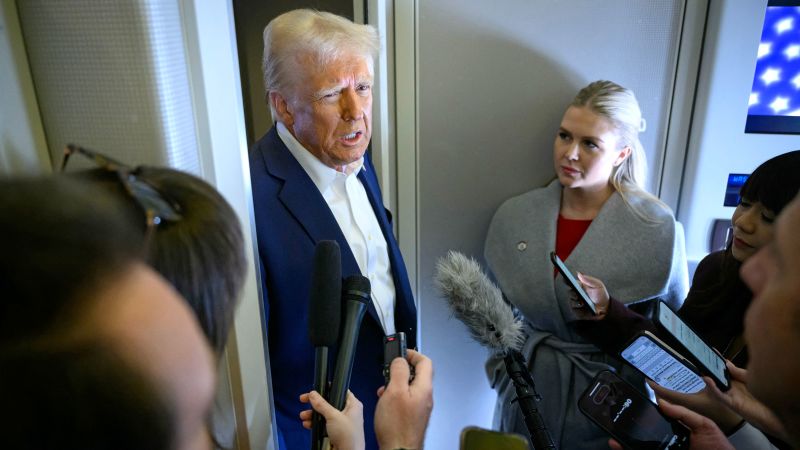“`html

Fact Check Analysis: Trump Suggests Plan for Gaza Strip
Thanks to one of our dedicated DBUNK subscribers for submitting this fact check request. You too can submit articles for verification through our soon-to-launch DBUNK app. As always, we dive deep into such topics to provide users with accurate, well-scrutinized analyses. Let’s separate fact from fiction regarding the recent CNN article titled, “Trump suggests his plan for Gaza Strip is to ‘clean out the whole thing’.“
Initial Findings on the Article
At face value, the article by Betsy Klein from CNN seems strikingly sensational, yet certain statements within the piece contain inaccuracies, missing context, and vague reporting that warrants immediate scrutiny. While provocative language, such as “clean out the whole thing,” serves as an attention-grabbing headline, it risks misinterpretation without adequate explanation of the geopolitical intricacies involved. Misinformation or oversimplified narratives about sensitive topics like the Israeli-Palestinian conflict can lead to public confusion and further polarization.

Misinformation and Missing Context Found
1. Misrepresentation of Jordan and Egypt’s Positions:
The article strongly implies that former President Trump’s alleged proposal to relocate over one million Palestinians to Jordan and Egypt is feasible and part of an ongoing dialogue. However, it provides no evidence about Jordan or Egypt’s willingness to accept such measures. Historically, both countries have firmly rejected similar propositions. For instance, Jordanian officials have consistently stated their opposition to solving the Israel-Palestine issue by transferring Palestinians to their territory, as it threatens the stability and demographic composition of Jordan.
The report lacks critical voices from Jordanian or Egyptian leadership regarding Trump’s statement. There’s no indication that these nations were consulted or supportive of such a plan at the time of publication. Omitting such essential facts skews the understanding of the context, potentially misleading readers into believing this idea is under genuine consideration by all parties involved.

2. The Use of Ambiguous Terminology:
The phrase “clean out the whole thing,” attributed to Trump, is a loaded and imprecise comment. CNN fails to interrogate what this statement entails. Does it signify a total evacuation of the Gaza Strip, or is it hyperbolic language referencing infrastructure destruction during conflict? By leaving key terms undefined, the article amplifies potential misinterpretations without clarifying Trump’s exact intent. Responsible reporting should have sought further clarification through follow-up questions.
3. Uneven Reporting and Lack of Expert Analysis:
While the article quotes Trump’s remarks, no counterbalance from regional experts, historians, or policymakers is included to provide depth or challenge his positions. The absence of such perspectives may mislead readers into assuming a unilateral narrative. Given the centuries-long conflict in the area, Trump’s plan lacks critical scrutiny regarding its feasibility and the implications of removing a population from their homeland under such circumstances.
Answers to Reader Questions
Why would Trump think Jordan and Egypt would agree to take in over a million Palestinians, and has anyone asked how they feel about this?
Historically, both Jordan and Egypt have expressed trepidation about absorbing Palestinian refugees. Trump’s comments seem to stem from a long-standing misconception among some U.S. policymakers who view these neighboring nations as solutions to the ongoing Israeli-Palestinian conflict. However, Jordan and Egypt have repeatedly rejected proposals that undermine Palestinian statehood or fundamentally alter their populations. Jordan’s King Abdullah II, in particular, views Palestinian resettlement as a threat to the kingdom’s internal stability, given the large population of Palestinians already residing in the country. Egypt, grappling with its own domestic challenges, is similarly unlikely to embrace such resettlements.
Regrettably, the CNN article does not address these critical concerns. This omission deprives readers of a comprehensive understanding of regional dynamics, making Trump’s suggestions appear more plausible than they realistically are.
Conclusion
While Betsy Klein’s report highlights a provocative policy suggestion from former President Trump, it suffers from missing context, misrepresentation, and a lack of nuanced discussion. Readers must approach the article cautiously, recognizing its significant omissions and oversimplifications. At DBUNK, we recommend engaging with multiple credible sources and using fact-checking tools like ours to navigate complex issues more informatively.

Our latest fact-checking app equips you to uncover the truth—empowering you in the fight against misinformation. Download DBUNK soon, and join us on social media to stay informed!

